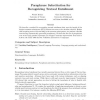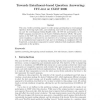CLEF
2006
Springer
14 years 3 months ago
2006
Springer
Abstract. This paper describes the technique for translation of character n-grams we developed for our participation in CLEF 2006. This solution avoids the need for word normalizat...
CLEF
2006
Springer
14 years 3 months ago
2006
Springer
We present a report about our participation in the ImageCLEF photo task 2006 and a short description of our new framework for future use in further CLEF participations....
CLEF
2006
Springer
14 years 3 months ago
2006
Springer
Geographic Information Retrieval (GIR) community has generally accepted the thesis that both thematic and geographic aspect of documents may be useful for GIR. This paper describe...
CLEF
2006
Springer
14 years 3 months ago
2006
Springer
After being a pilot track in 2005, GeoCLEF advanced to be a regular track within CLEF 2006. The purpose of GeoCLEF is to test and evaluate cross-language geographic information ret...
CLEF
2006
Springer
14 years 3 months ago
2006
Springer
We describe a method for recognizing textual entailment that uses the length of the longest common subsequence (LCS) between two texts as its decision criterion. Rather than requi...
CLEF
2006
Springer
14 years 3 months ago
2006
Springer
This year, besides providing support to other groups participating in cross-language Question Answering (QA) tasks, and submitting runs both for the monolingual Italian and the cr...
CLEF
2006
Springer
14 years 3 months ago
2006
Springer
Nowadays, cross-lingual Information Retrieval (IR) is one of the greatest challenges to deal with. Besides, one of the most important issues in IR consists in the corpus vocabular...
CLEF
2006
Springer
14 years 3 months ago
2006
Springer
We describe WiQA 2006, a pilot task aimed at studying question answering using Wikipedia. Going beyond traditional factoid questions, the task considered at WiQA 2006 was to return...
CLEF
2006
Springer
14 years 3 months ago
2006
Springer
This paper details the participation of the XLDB group from the University of Lisbon at the GeoCLEF task of CLEF 2006. We tested text mining methods that make use of an ontology t...
CLEF
2006
Springer
14 years 3 months ago
2006
Springer
The University of Maryland participated in the English and Czech tasks. For English, one monolingual run using only fields based on fully automatic transcription (the required con...


